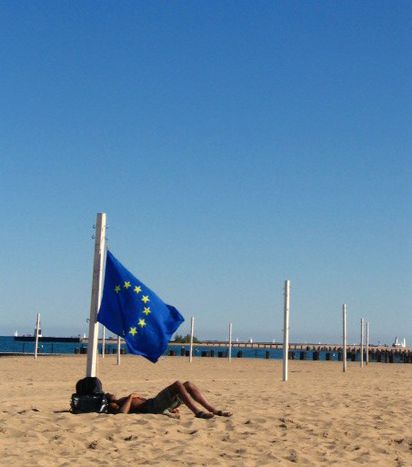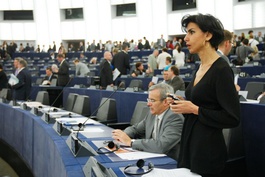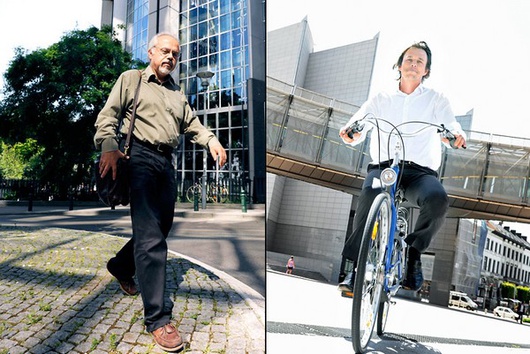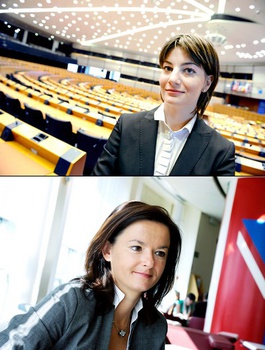
A seat in the European Parliament; a snake or a ladder?
Published on
Translation by:
Sarah GrayToday you won’t find EU politicians hammering on the doors of the European Parliament, especially if they dream of becoming heavyweights in national politics. There are still some politicians keen to be MEPs, however, but their motives aren’t always what they seem...
 In France a taboo was broken by the young politician Rama Yade’s refusal to obey the president and stand in this year’s European elections. The then-secretary of state for human rights preferred the risk of being disgraced in the eyes of her mentor Nicolas Sarkozy to the perceived threat of political exile in Strasbourg. ‘More interested in a national mandate,' she declined the offer to avoid exile from the French political scene.
In France a taboo was broken by the young politician Rama Yade’s refusal to obey the president and stand in this year’s European elections. The then-secretary of state for human rights preferred the risk of being disgraced in the eyes of her mentor Nicolas Sarkozy to the perceived threat of political exile in Strasbourg. ‘More interested in a national mandate,' she declined the offer to avoid exile from the French political scene.
Heads of states, indignant at this trend, do their best to paint the European parliament as a place ‘where the best are sent’. On the ground, however, attitudes differ. Rachida Dati for example, France’s minister for justice, attorney general and mayor of a Paris arrondissement (district), was unable to avoid this ‘soft punishment’ for fear of receiving harsher treatment. She gave in, but only after bargaining with the powers that be, attempting to ensure her future in national politics through ensuring her return to government as soon as the European mission ends. Dati’s attitude is rather typical. A European seat, far from being seen as a promotion, is considered more of a constraint, or worse, a sacrifice.
Getting in on the action
 The same is true on both sides of the political spectrum. Olivier Besancenot, spokesman of the French new anticapitalist party (NPA), stood in the recent European elections but only took the third position on the party’s list, giving himself little chance of being elected. Why? ‘To continue the fight on the streets of France.’ The implication was that he wished to maintain his profile in national politics and focus on his main objective, the 2012 presidential elections. Even the youngest French MEP, centrist Damien Abad, 29, interprets his post in the light of national politics, seeing it as a springboard to future election in France. ‘I will be fully committed to the job in Strasbourg,’ he says, ‘but I want to establish myself as a contender in the Rhône, where I will be at the top of the list for the regional government elections.’
The same is true on both sides of the political spectrum. Olivier Besancenot, spokesman of the French new anticapitalist party (NPA), stood in the recent European elections but only took the third position on the party’s list, giving himself little chance of being elected. Why? ‘To continue the fight on the streets of France.’ The implication was that he wished to maintain his profile in national politics and focus on his main objective, the 2012 presidential elections. Even the youngest French MEP, centrist Damien Abad, 29, interprets his post in the light of national politics, seeing it as a springboard to future election in France. ‘I will be fully committed to the job in Strasbourg,’ he says, ‘but I want to establish myself as a contender in the Rhône, where I will be at the top of the list for the regional government elections.’
'I am very surprised to be elected. I had other plans but now I will be fully committed'
On the other hand, for some getting elected as an MEP came as an unexpected but welcome surprise. This was the case for the young candidates of Europe Ecologie (Europe ecology), France’s green electoral coalition, on the list for the Ile-de-France region. Journalist Pascal Canfin, 35, and Karima Delli, 29, a green activist since 2005, campaigned alongside green party leader Daniel Cohn-Bendit and his green alliance. They were rewarded with seats in Strasbourg. ‘I am very surprised to be elected,' Delli has said. 'I had other plans but now I have won a seat I will be fully committed to it. Europe Ecologie is a movement for action. I call upon all those who want to join us to take advantage of our success. I am committed to action because my generation has a responsibility and I am going to do all I can to honour that.’
So is a European seat a snake or a ladder to a political career? There is no shortage of examples in other European states. In Germany, for example, a European role was very useful to the popular politician Cem Özdemir, current co-chairman of the German green party. After his involvement in a 2002 scandal, in which he was accused of abusing his position and taking free flights (the ‘Hunzinger Affair’), he got elected to the European Parliament and laid low for a while. He has since been able to return discretely to the national political scene. Now some are even calling him the German Obama!
Money, money, money
 MEPs receive a salary which is at least equal to that of their national counterparts, in addition to some rather large allowances for expenses (all in all just more than €7000 - £ 6018 - per month). Ultimately, is this not a major factor motivating European candidates? After all, this remuneration guarantees any MEP a comfortable set-up and can even be considered a good source of funding. This goes some way to explaining the paradoxical presence of eurosceptic parties such as the French national front and the United Kingdom independence party (UKIP) on the Strasbourg benches.
MEPs receive a salary which is at least equal to that of their national counterparts, in addition to some rather large allowances for expenses (all in all just more than €7000 - £ 6018 - per month). Ultimately, is this not a major factor motivating European candidates? After all, this remuneration guarantees any MEP a comfortable set-up and can even be considered a good source of funding. This goes some way to explaining the paradoxical presence of eurosceptic parties such as the French national front and the United Kingdom independence party (UKIP) on the Strasbourg benches.
Finally, there is one other category; those who have seen the European oasis disappear before their eyes. In Poland, Kazimierz Marcinkiewicz, the ex-prime minister and leader of the conservative eurosceptic Prawo i Sprawiedliwosc (law and justice) party, had no hesitation in switching his allegiances in order to stand as an MEP representing the centre-right PO party led by Donald Tusk, his successor at the head of Poland’s government. But this crafty manoeuvre was in vain. A scandalous divorce (he left his wife for a 28-year-old woman) saw his political credibility and conservative following diminish both at home and in Europe. A pity; if he ever had made the parliament, he would have found himself among many (see above) who don’t always practice what they preach.
Translated from Le mandat européen : planque ou tremplin ?



